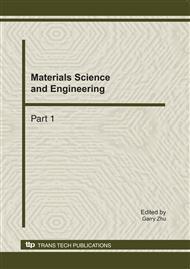[1]
Anying Liu: The Concept of Self Review and Development Trend of the Theory. Chinese Journal of Psychological Science. Vol. 27 (2004), pp.248-249.
Google Scholar
[2]
Xiaojun Zhao, Qinghua Fu, Tengyun Chen: Students of Different Regions of the Crowd Stereotypes. International Chinese Psychosomatic Medicine Journal. Vol. 5 (2004), pp.32-33.
Google Scholar
[3]
Vispoel,W. P: Self-Concept in Artistic Domanins: An Extension of the Shavelson, Hubner, andStanton(1976)Model. Journal of Educational Psychology. Vol. 87 (1995), pp.134-153.
DOI: 10.1037/0022-0663.87.1.134
Google Scholar
[4]
Shavelson R.J., &Bolus, R: Self-Concept: The Interplay of Theory and Methods. Journal of Educational Psychology, Vol. 74 (1982), pp.3-17.
DOI: 10.1037/0022-0663.74.1.3
Google Scholar
[5]
Marsh H.W., Shavelson,R. J: Self-Concept: Its Multifaceted Hierarchical Structure. Educational Psychologist, Vol. 20 (1985), pp.108-125.
DOI: 10.1207/s15326985ep2003_1
Google Scholar
[6]
Marsh,H. W: The Big–Fish-Little-Pond Effects on Academic Self-Concept. Journal of Educational Psychology, Vol. 79 (1987), pp.280-295.
DOI: 10.1037/0022-0663.79.3.280
Google Scholar
[7]
Marsh H.W., Byne B.M., &Shavelson,R. J: A Multifaceted Academic Self-Concept: Its Multifaceted Hierarchical Structure and Its Relation to Academic Achievement. Journal of Educational Psychology, Vol. 80 (1988), pp.366-380.
DOI: 10.1037/0022-0663.80.3.366
Google Scholar
[8]
Marsh,H. W: Ae and Sex Effects in Multiple Dimentions of Self-Concept: Preadolescence to Early Adulthood. Journal of Educational Psychology, Vol. 81 (1989), pp.417-430.
DOI: 10.1037/0022-0663.81.3.417
Google Scholar
[9]
Marsh,H. W: Causal Ordering of Academic Self-concept and Academic Academic Achievement multilongitudinal Panel Analysis. Journal of Educational Psychology, Vol. 82 (1990), pp.646-656.
DOI: 10.1037/0022-0663.82.4.646
Google Scholar
[10]
Marsh,W. H: The structure of Academic Self-Concept: The Marsh /Shavelson Model. Journal of Educational Psychology. Vol. 82(1990), pp.623-636.
DOI: 10.1037/0022-0663.82.4.623
Google Scholar
[11]
Marsh,W. H: Using the National Longitudinal Study of 1988 to Evaluate Theoretical Models of Self-Concept: The Self-Description Questionnaire. Journal of Educational Psychology, Vol. 86 (1994), pp.439-456.
DOI: 10.1037/0022-0663.86.3.439
Google Scholar
[12]
Marsh H.W., Ayotte,V.: Do Multiple Dimensions of Self-Concept Become More Differentiated Distinctiveness Hypothesis. Journal of Educational Psychology, Vol. 95 (2003), pp.687-706.
DOI: 10.1037/0022-0663.95.4.687
Google Scholar
[13]
Marsh W.H., Dowson,M., Pietsch,J. Walker,R.: Why Multicollinearity Matters: a Reexamination of Relations Between Self-Efficacy, Self-Concept, and Achievement. Journal of Educational Psychology, Vol. 96 (2004), pp.518-522.
DOI: 10.1037/0022-0663.96.3.518
Google Scholar
[14]
Marsh H.W., Kit-Tai Hau: Explaining Paradoxical Relations Between Academic Self-Concepts and Achievements: Cross-Cultural Generalizability of the Internal/External Frame of Reference Predictions Across 26 countries. Journal of Educational Psychology, Vol. 96 (2004).
DOI: 10.1037/0022-0663.96.1.56
Google Scholar
[15]
XiaoJun Zhao: Preliminary Compile of Self-concept Scale on Junior High School in the Northwest China Region . Chinese journal of health psychology, Vol. 14 (2006), pp.703-707.
Google Scholar
[16]
Zhenhong Wang: The Relationship Research between Students Self-concept and Coping Style. Chinese Journal of Psychological Development and Education. Vol. 17 (2001), pp.22-27.
Google Scholar
[17]
Weifang Hu: A Survey Study about the Concept of College. Chinese Journal of Psychological Science. Vol. 27 (2004), pp.1223-1225.
Google Scholar
[18]
Yubo Hou, Ying Zhu: The Influence of Chinese Culture on Way of Thinking. Chinese Acta Psychologica Sinica,Vol. 34 (2002), pp.106-111.
Google Scholar


